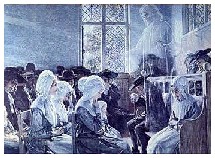


 |
 |
 |
For definitions and examples of particular words common to Biblical Studies scholarship, see also my Biblical Studies Glossary page. If there are other particular terms or issues you'd like included here, please EMail me.
-- Susan Jeffers - EMail: susan@read-the-bible.org
This web page was last updated 6/29/2010
Here are some situations in which biblical scholars use different terms for everyday concepts, or where everyday terms mean something different to scholars:
Everyday usage: A.D. (Anno Domini, Latin for "year of our
Lord"; e.g. the Romans destroyed Jerusalem in 70 A.D.)
Scholars often use instead: C.E. (Common Era, a term that lets
us know which date we're talking about without bringing religion into it)
Everyday usage: B.C. (Before Christ)
Scholars often use instead: B.C.E. (Before Common Era)
Everyday usage: Old Testament
Scholars use instead: depends upon exactly which biblical books are being
discussed, in which order, for what purpose and in what context. "Tanakh"
means the Bible as defined by the Jewish tradition, with the books arranged
in the order of Torah, Prophets ("Nevi'im"), Writings ("Ketuvim").
"Hebrew Bible" sometimes means Tanakh, sometimes what most
Christians refer to as Old Testament. Some scholars would have those speaking
in a Christian context refer to the "First Testament" and "Second
Testament," but this hasn't caught on much.
Everyday usage (now somewhat archaic): man, men or mankind, when
referring to people generally
Scholars use instead: humanity, people, persons (in order not to appear
to exclude women where they ought to be included); similarly for "he"
vs. "he or she" or changing the syntax to be inclusive.
Everyday usage: Israel, Palestine, the Holy Land
Scholars use instead: varies tremendously depending on the intent, political
orientation, and sensitivity of the author. Any use of "Israel" or
"Palestine" must be sure not to confuse the ancient biblical uses
with the modern political ones. "The Holy Land" would be of limited
use to scholars because of its religious overtones (!). Often scholars speak
of "the ancient Near East" or "ancient Israel," or specify
more closely what geographical or political entity they mean, such as "Palestine
in the Herodian period" or "pre-monarchic Israel."
Everyday usage: critic (one who makes negative judgments about
someone or something); criticism (the content or process of negative
judgment); critical (expressing negative judgment).
Scholarly usage: a critic is one who makes well-reasoned scholarly
analyses and evaluations; criticism is the process of conducting such
analyses and evaluations; and critical studies are well-conceived scholarly
endeavors. In particular, biblical criticism refers to the ways scholars
study the Bible using various criteria and methods. A critical edition
of a text is one that carefully notes textual variants and difficulties and
provides an "apparatus" so the reader can find the sources of the
variants and difficulties. For example, the UBS and NA are two critical editions
of the Greek New Testament.
Everyday usage: theory (something made up or unsupported; the
opposite of fact)
Scholarly usage: A theory is a set of hypotheses or assertions
about how things work or what is or was the case, supported by data and logic
and other theories. It's the scholarly world's best attempt at stating what
is true. Theory is always subject to change in the face of new data or better
logic. In everyday usage, to call something a theory can be a sort of insult;
not so in scholarly usage.
Everyday usage: Non-experts expect experts to provide proof and
facts in their area of expertise.
Scholarly usage: Scholars seek support (data and accompanying
interpretation and logic) for hypotheses and theories. They aim
to come up with defensible, well-supported theories, not proof.